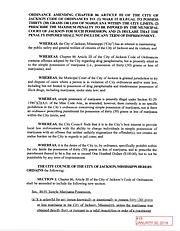Ward 4 Councilman De'Keither Stamps proposed a change to Jackson's ordinances at a Jan. 30 meeting that would decriminalize possession of user-level amounts of marijuana. Photo by Imani Khayyam.
Monday, February 5, 2018
JACKSON — Ward 4 Councilman De'Keither Stamps proposed a change to Jackson's ordinances last week that would decriminalize possession of user-level amounts of marijuana. The public can attend a hearing at 6 p.m. today at City Hall for citizens to voice their concerns and ask questions.
If the ordinance passes, those in Jackson in possession of 30 grams of marijuana or less would pay a fine of no more than $100 and not serve any prison time. Prescription marijuana would not be subject to these same penalties in the City ordinances.
"We're introducing this to decriminalize user level amounts of marijuana because for far too long we have made a practice of turning users into criminals," Stamps said at the Jackson City Council meeting on Jan. 30.
The Mississippi Code enforces punishments for marijuana possession of 30 grams or less by a fine of $100 to $250 with no jail time for the first offense. However, a second conviction for simple possession within two years is a misdemeanor carrying the punishment of a $250 fine, no more than 60 days in the county jail and mandatory enrollment in a drug-education program approved by the Division of Alcohol and Drug Abuse of the State Department of Mental Health, unless a court finds this inappropriate. Any subsequent conviction after that within two years merits a fine between $250 and $1,000 and up to six months in county jail.
If a person operating a motor vehicle possesses up to 30 grams of marijuana, he or she would face a misdemeanor charge, and if convicted, would face a maximum fine of $1,000, up to 90 days in county jail or both.
Stamps' ordinance does not address how the City will handle second-time offenders of simple possession laws or when drivers carry 30 ounces or less of marijuana.
Councilman Stamps is targeting Jackson's ordinances, which are "presently silent," as he characterized them, on punishing simple possession within Jackson's city limits. The current ordinances about simple possession only say that no person charged with possession of one ounce or less would face the punishments for those violating the City's drug-paraphernalia ordinances.
City ordinances include an extensive list of illegal items considered to be drug paraphernalia that can be used for planting, growing, preparing, manufacturing or ingesting outlawed substances. Persons violating these paraphernalia ordinances are subject to a fine not to exceed $500, city jail time up to 90 days or both.
The new proposed ordinance also suggests training for the Jackson Police Department to learn the difference between the proposed City ordinance and State law.
"Whereas, the City Council finds that it is in the City's best interest to provide local law enforcement with the ability to charge individuals in simple possession of marijuana with an offense that neither unfairly stigmatizes the offender(s), nor creates an undue burden on the City in regards to jail costs," Stamps' introduction of the ordinance reads.
A 2013 American Civil Liberties Union study on the racial disparities of criminalizing marijuana showed that although blacks and whites use marijuana pretty much equally, blacks are 3.73 times as likely to be arrested for marijuana possession. The study also says enforcing marijuana laws can cost $3.6 billion annually.
Jennifer Riley-Collins, the executive director of the ACLU of Mississippi, spoke at the meeting, commending Stamps, while offering ways the ordinance could be improved so that fines will not lock poorer people into a debtors' prison scheme.
"(The proposed ordinance) could potentially be plagued with the same selective enforcement woes as marijuana criminal laws, and those unable to pay fines could face arrest and imprisonment," Riley-Collins said to the council. "We therefore ask in its implementation that the City of Jackson ensure that those who cannot afford to pay the associated fine because of indigence are not penalized for being poor...."
Email city reporter Ko Bragg at [email protected].


Comments
Use the comment form below to begin a discussion about this content.
Sign in to comment
Or login with:
OpenID